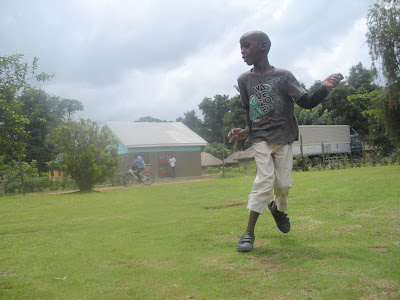And let's be honest- the food is better here. There are many things I did not/do not like in the states that I like/don't mind here: green pepper, mango, papaya, pineapple, and sweet potatoes. Despite Uganda having laws forbidding genetically modified organisms from entering markets here, the enforcement is lacking. So there might be some Monsanto seeds, hybrid fruits (the oranges that don't get orange is a key suspect), and a lot of non-native species (jack fruit and cassava) the food is nonetheless fresh, local, and delicious.
 |
| Eggs. A dozen would go for like $1.50 |
 |
| Oranges (they stay green here) and avocado |
You buy real produce, with spots, bumps, and uneven ripeness. You buy real food from real people.
You cook everything (eggplant, cabbage, cassava, sweet or white potato, beans, eggs) basically the same: caramelize onions, throw in tomatoes (green peppers are optional), make a sauce, insert boiled/stir fried main dish here. Add to rice or other starch and you're good to go.
 |
| Onion and ginger |
I guess if I ate meat, I would be a bit put off by the open air meat shacks that sell goat meat. You buy chickens or turkeys live, and do everything else yourself. Beef isn't on the market now because all the cattle in the country have all been immunized against some disease and can't be sold for 3 months. You can get milk or yogurt at the grocery store, but its expensive and not that good. The only animal products I eat are eggs and a butter-like spread.
 |
| A rather small papaya |
That's not to say everything here is health food. Acholi cooking involves a rather off-putting amount of oil. They judge me for only putting one teaspoon of sugar into my tea. There's a ton of salt and a beef ramen-noodle like flavoring in everything. They love soda, and a magarine-like spread that doesn't need refrigeration. And Westerners have brought chips (french fries) here (why sweet potato fries aren't popular yet is beyond me). But really, without processed food, salty food isn't going to kill you.
Since moving out of our home-stays, we've had some wonderful cooking adventures. Our house is equipped with slightly above average cooking accessories: two burner propane stove (only one burner works consistently) instead of a one burner charcoal stove, running water and electricity.
 |
| Beans (about $1 a pound) |
Soon after we moved in, we realized why our home-stay families usually have one member of the family whose contribution to the household is solely cooking; the Acholi way of cooking with one burner takes at least 3 hours.
You'd be surprised how many college students don't know how to cook rice without a rice cooker. Here, you have to sort the rice to remove sticks and stones.
We had a little cassava incident because we only found out after we ate cassava and we all had the runs that cassava has mild toxins in it and you have to soak it before you eat it, otherwise it's mildly poisonous.
 |
| Rice, Irish potatoes, and the ever-present onion/tomato sauce |
 |
| Why is Guacamole not more of a thing here? |
 |
| Our first attempt at Chapati, a fried maize flour tortilla like thing that kinda tastes like Indian nan, and probably is Uganda's version on nan considering the Indian influence. |









































